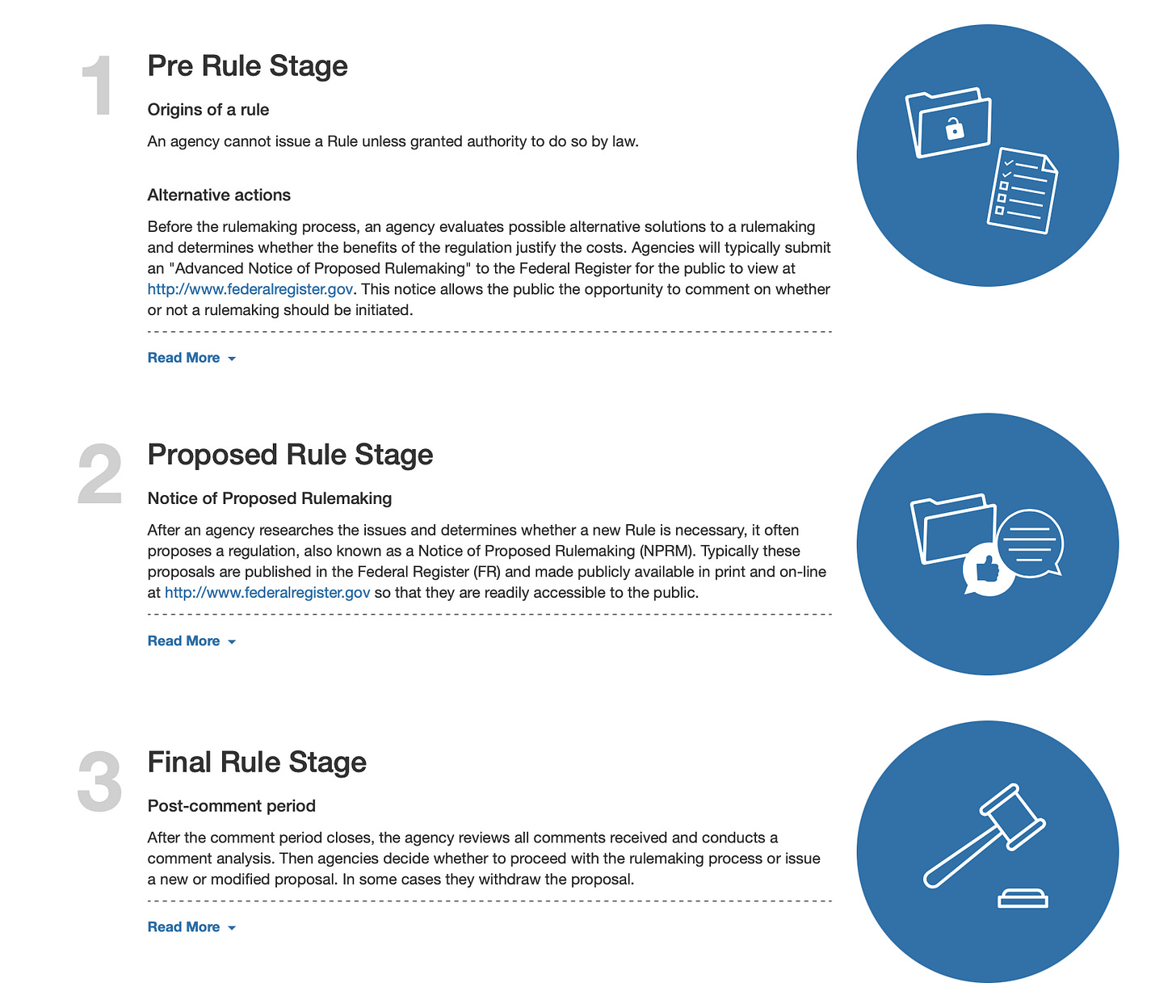When I was Little Heather, I would rush home from school to watch television. I hated Gilligan’s Island. Petty Coat Junction was okay. But what I really waited for was Schoolhouse Rock! I didn’t care about “My Hero, Zero” or any of the multiplication snippets. I waited every single day for “I’m Just a Bill” to come on. Yup, Little Heather was a lot like Big Heather.
But Bill left us at a crucial moment. A moment that, arguably, is the most important part of the process. Rulemaking. It sounds boring as hell and, to be honest, it should be boring as hell. Unfortunately, in this hyper-politicized environment, rulemaking is the devil’s playground.
Rules What Rules?
After a bill is signed into law at the federal or state level, that legislation enters the rulemaking process. When agencies are functioning well, laws go through the following process.
Note that the legislative body must grant the assigned agency both general and specific rulemaking authority. “Typically, when Congress passes a law to create an agency, it grants that agency general authority to regulate certain activities within our society. Congress may also pass a law that more specifically directs an agency to solve a particular problem or accomplish a certain goal.” (A Guide to the Rulemaking Process).
In 1974, Florida revised the Administrative Procedure Act (APA) because state legislators were “increasingly concerned that Florida was being run by a ‘phantom government,’ meaning that unelected bureaucrats were running the state through the use of largely unknown or inconsistently applied unauthorized rules or uncirculated memoranda hidden away in bureaucrats’ desk drawers.” Sound familiar?
Rules can not be arbitrary. They can’t be capricious. They can’t be vague and they can’t vest “unbridled discretion in an agency.”
Weaponized Bureaucrats and Phantom Governments
Rulemaking is designed to allow maximum public input before taking effect. It is the time for concerns to be aired, questions to be asked, and recommendations to be made. It would be interesting to know how many of the thousands of rules proposed nationwide every year receive any public input. My guess is very little. It’s a lot of inside baseball played by attorneys, lobbyists, and trade associations. And that’s a problem.
For example, the Florida Board of Education met on January 17, 2023. There were thirty-six items on their agenda. Twenty-two proposed and amended rules were included on the consent agenda. No questions, no public comments, no discussion.
Much has been made about that meeting, which was held two days after we reflected on the life and work of Martin Luther King, Jr. without a hint of irony. During the meeting, at the request of Commissioner Manny Diaz et al, the Board approved rules that prohibit the use of taxpayer dollars to “advocate” for diversity, inclusion and equity on college campuses. The rule also prohibits the promotion or engagement in “political or social activism” as defined in the rule. (Minute 1:10:30).
Before calling for a motion, the Board Chair did not open the floor up for public comment. Board Member Ryan Petty celebrated with a Tweet proclaiming that “Florida is where DEI goes to DIE.”
Oh, but that’s not all. One hour and twenty minutes into the meeting Board Members voted to remove Sociology as an option for students in choosing their general education core courses. Chancellor Hebda told the Board, that the legislative intent is to make sure core courses are not based on “unproven or speculative or exploratory content.” Commissioner Manny Diaz echoed that when told the Board that core courses can not be based on “theories” or “identity politics.” Again, the rule was adopted without an opportunity for public comment.
But Wait, There’s More
Without discussion or public comment and despite communication from me requesting the item be removed from the consent agenda for further discussion, the Board adopted was 6A-25.021. The rule establishes “suspension, termination, or revocation of service providers.” It was one of twenty-two new and amended rules on the consent agenda.
The new rule, which applies to nonprofits that provide work readiness and placement services to disabled Floridians, is loaded with overreach. All of which I shared during the public comment phase in December 2023. For some inexplicable reason, those public comments are not made available to the public. In other words, I have no idea how many other members of the public commented or what those comments entailed. But I do know that service providers can no longer talk smack about the Florida Department of Education, Division of Vocational Rehabilitation, and the Division will no longer pay for resume-writing classes for disabled high schoolers if those classes are offered on-campus during the school day.
Amended rule 6A-4.01791, which applies the educators who teach gifted students. Gifted-endorsed teachers still have to have fifteen hours of specific education to earn the endorsement, but training specific to “social and emotional” needs is no longer required. Social and Emotional Learning is the newest battleground in the culture wars and, of course, Florida is the tip of the spear.
Principals are no longer required to undergo professional development in “ethical leadership.” Students attending the residential Career, Technology, and Training Center will be marked “tardy” if they leave their “cane” in their dorm room and they aren’t allowed to wear camouflage clothing or clothing that contains a “political message.” And now, in Florida, rules governing apprenticeship require that “the apprentice must be a paid employee of the sponsor or participating employer.”
Rules Are Rules
I know you think you don’t have time to engage in rulemaking. But in reality, rules are where the rubber meets the road. When the public doesn’t engage, it gives too much power to the people who draft and approve the rules have all the power. And meetings, like the January 17, 2024, Board of Education meeting become perfunctory.
If you have found yourself on the losing end of a rule, you can challenge it but it’s expensive. Better to speak up when you have the chance. Whether you're heard or not is another matter entirely.




